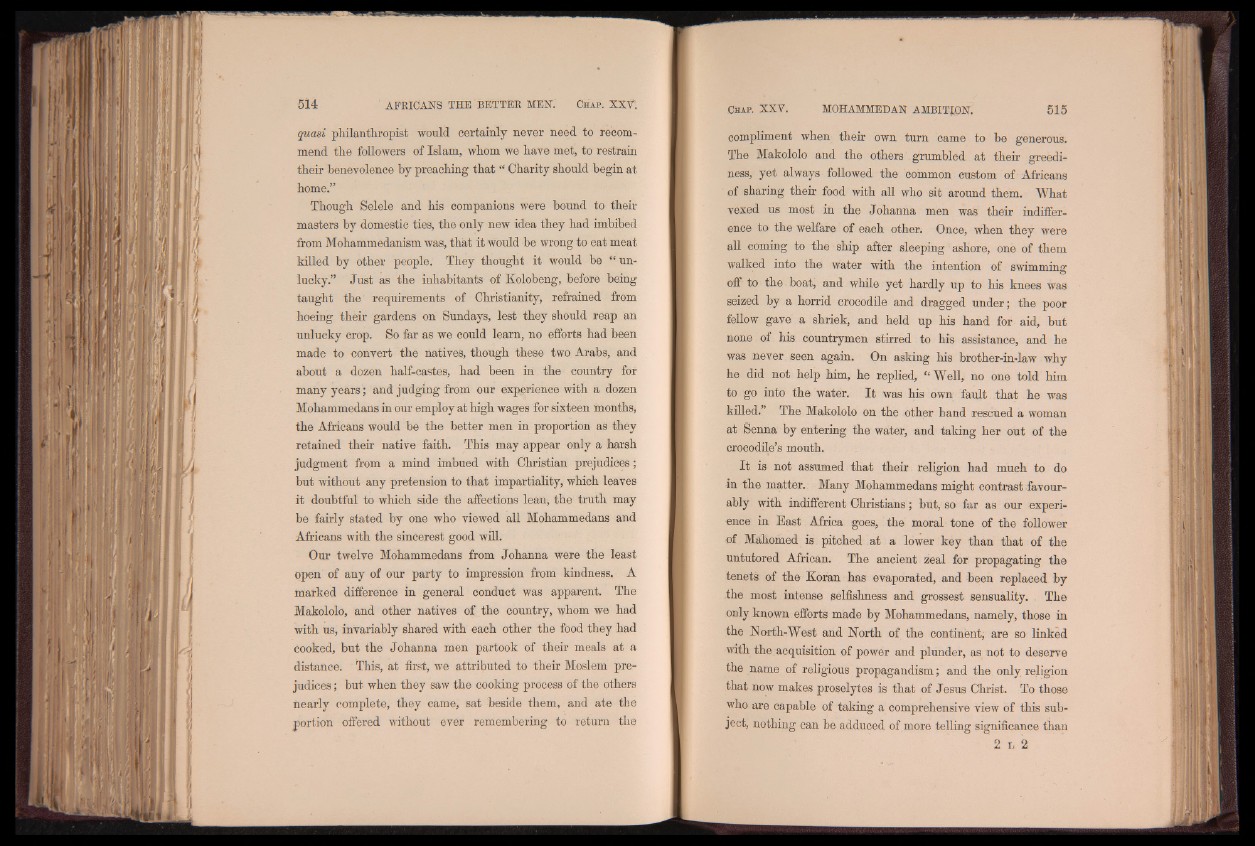
quasi philanthropist would certainly never need to recommend
the followers of Islam, whom we have met, to restrain
their benevolence by preaching that “ Charity should begin at
home.”
Though Selele and his companions were bound to their
masters by domestic ties, the only new idea they had imbibed
from Mohammedanism was, that it would be wrong to eat meat
killed by other people. They thought it would be “ unlucky.”
Just as the inhabitants of Kolobeng, before being
taught the requirements of Christianity, refrained from
hoeing their gardens on Sundays, lest they should reap an
unlucky crop. So far as we could learn, no efforts had been
made to convert the natives, though these two Arabs, and
about a dozen half-castes, had been in the country for
many years ; and judging from our experience with a dozen
Mohammedans in our employ at high wages for sixteen months,
the Africans would be the better men in proportion as they
retained their native faith. This may appear only a harsh
judgment from a mind imbued with Christian prejudices;
but without any pretension to that impartiality, which leaves
it doubtful to which side the affections lean, the truth may
be fairly stated by one who viewed all Mohammedans and
Africans with the sincerest good will.
Our twelve Mohammedans from Johanna were the least
open of any of our party to impression from kindness. A
marked difference in general conduct was apparent. The
Makololo, and other natives of the country, whom we had
with us, invariably shared with each other the food they had
Cooked, but the Johanna men partook of their meals at a
distance. This, at first, we attributed to their Moslem prejudices
; but when they saw the cooking process of the others
nearly complete, they came, sat beside them, and ate the
portion offered without ever remembering to return the
compliment when their own turn came to be generous.
The Makololo and the others grumbled at their greediness,
yet always followed the common custom of Africans
of sharing their food with all who sit around them. What
vexed us most in the Johanna men was their indifference
to the welfare of each other. Once, when they were
all coming to the ship after sleeping ashore, one of them
walked into the water with the intention of swimmingr
off to the boat, and while yet hardly up to his knees was
seized by a horrid crocodile and dragged under; the poor
fellow gave a shriek, and held up his hand for aid, but
none of his countrymen stirred to his assistance, and he
was never seen again. On asking his brother-in-law why
he did not help him, he replied, “ Well, no one told him
to go into the water. I t was his own fault that he was
killed.” The Makololo on the other hand rescued a woman
at Senna by entering the water, and taking her out of the
crocodile’s mouth.
I t is not assumed that their religion had much to do
in the matter. Many Mohammedans might contrast favourably
with indifferent Christians; but, so far as our experience
in East Africa goes, the moral tone of the follower
of Mahomed is pitched at a lower key than that of the
untutored African. The ancient zeal for propagating the
tenets of the Koran has evaporated, and been replaced by
the most intense selfishness and grossest sensuality. . The
only known efforts made by Mohammedans, namely, those in
the North-West and North of the continent, are so linked
with the acquisition of power and plunder, as not to deserve
the name of religious propagandism; and the only religion
that now makes proselytes is that of Jesus Christ. To those
who are capable of taking a comprehensive view of this subject,
nothing can be adduced of more telling significance than
2 l 2